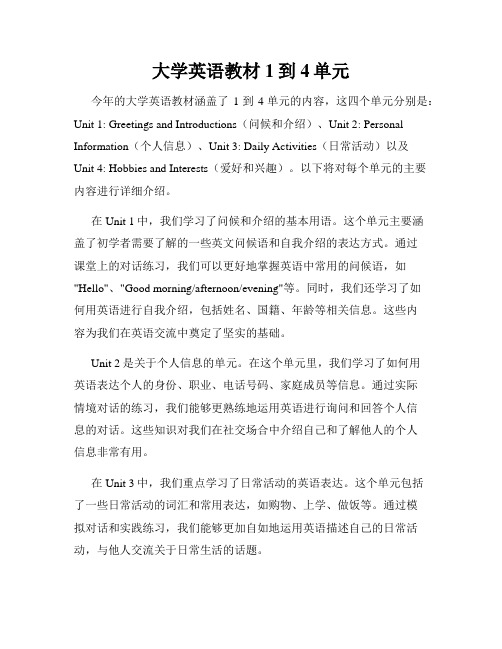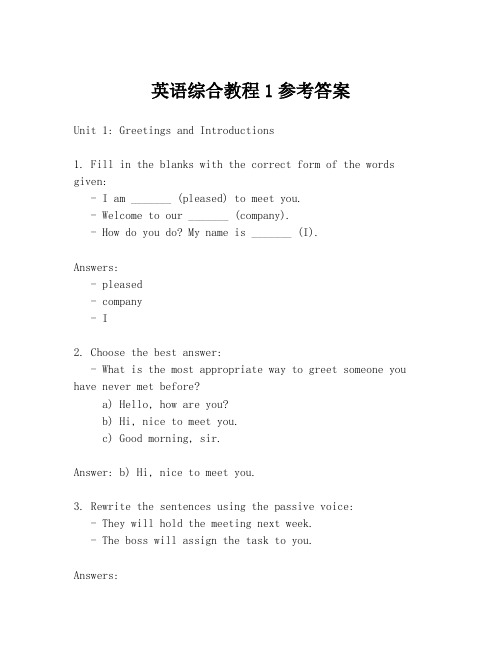Unit 1 Introductions and Greetings
大学英语教材1到4单元

大学英语教材1到4单元今年的大学英语教材涵盖了1到4单元的内容,这四个单元分别是:Unit 1: Greetings and Introductions(问候和介绍)、Unit 2: Personal Information(个人信息)、Unit 3: Daily Activities(日常活动)以及Unit 4: Hobbies and Interests(爱好和兴趣)。
以下将对每个单元的主要内容进行详细介绍。
在Unit 1中,我们学习了问候和介绍的基本用语。
这个单元主要涵盖了初学者需要了解的一些英文问候语和自我介绍的表达方式。
通过课堂上的对话练习,我们可以更好地掌握英语中常用的问候语,如"Hello"、"Good morning/afternoon/evening"等。
同时,我们还学习了如何用英语进行自我介绍,包括姓名、国籍、年龄等相关信息。
这些内容为我们在英语交流中奠定了坚实的基础。
Unit 2是关于个人信息的单元。
在这个单元里,我们学习了如何用英语表达个人的身份、职业、电话号码、家庭成员等信息。
通过实际情境对话的练习,我们能够更熟练地运用英语进行询问和回答个人信息的对话。
这些知识对我们在社交场合中介绍自己和了解他人的个人信息非常有用。
在Unit 3中,我们重点学习了日常活动的英语表达。
这个单元包括了一些日常活动的词汇和常用表达,如购物、上学、做饭等。
通过模拟对话和实践练习,我们能够更加自如地运用英语描述自己的日常活动,与他人交流关于日常生活的话题。
最后一个单元是关于爱好和兴趣的内容。
在Unit 4中,我们学习了如何用英语谈论自己的兴趣爱好,包括运动、音乐、阅读等。
通过课堂上的角色扮演和小组讨论,我们可以积极参与到与爱好相关的对话中,提高自己的口语表达能力。
此外,我们还学习了如何邀请他人参加活动以及接受邀请的表达方式,为今后的社交交流提供了基础。
这四个单元涵盖了大学英语教材1到4单元的主要内容。
Unit 1 Greetings and Introductions(英语教程1)

Listening
Tapescript A. 1. base 4. luck 7. loud 10. rank
2. fire 3. clerk 5. funny 6. old 8. wander 9. help
Listening
Tapescript B.
Mrs. Fenton: Hello! I’m so happy to see you. Come in! Mrs. Hunt: Carol, you look wonderful. Mrs. Fenton: Thank you, Sarah—you look wonderful, too. And the children—they’re both so tall! Mrs. Hunt: Well—you haven’t seen them for five years. Mr. Hunt: Sarah, you’ve forgotten to introduce Sheila.
英语教程(修订版)
1
Unit 1 Greetings and Introductions
外语教学与研究出版社
Unit 1 Greetings and Introductions
1 2 3 4 Warming-up Listening
Reading
Speaking
5
6
Writing
Fun Time
Warming-up
B. base √
C. boss C. fire √ C. cluck C. look C. Tony C. Ed C. loud √ C. window C. held C. tank
Listening
B. You will hear a dialogue. It will be read twice. Listen carefully and choose the right answer to each question.
Unit1Greetings and Introductions

glad
really Olympic sail regatta
快乐的
确实、真的 奥运的 航行 赛船会
the Qingdao Olympic Sailing Regatta 青岛奥帆赛
Expressions of meeting people for the first time
Nice/Glad/Happy/Pleased to meet you. How do you do?
Expressions of meeting people again
Long time no see. Haven't seen you for ages. Do you still remember me? How is...? How are things going...? What brings you here? I'm here on/ to/for... What a pleasant surprise. It's a small world. Would you care for ...? Suppose you happen to meet an old friend at the railway station, Make a dialogue to greet each other.
Example 2:
My name is ________. I am graduate from ________ senior high school and major in ________. There are ________ people in my family. My father works in a computer company. And my mother is a housewife. I am the youngest one in my family.
中职英语第一册-Unit-1-Greetings-and-introductions

4
*call sb. up 给某人打电话 昨天他给我打电话了。
- He called me up yesterday.
4.vocational 职业的 adj. vocation 工作,职业 n. vacation 假期=holiday n.
5. 句型 How is it going? 熟人打招呼用语,
-ing 结尾的形容词,主语常指物,表 示“某物令人感到……”
类似的常考的几个词: boring 令人讨厌的 bored感到厌烦的 exciting令人兴奋的 excited感到激动的 surprising令人惊奇的 surprised感到好奇的
17
18
n. 兴趣 interest 4.代词(专门课题)
(sing).
7
Lesson 2 This is my friend Wang Tao.
1. meet v. 遇到 过去式→met 遇到某人 meet sb. 偶然遇到 meet with sb. - He met with a friend in the street. -The plan meets with our ideas. 符合 n. 集会 meet / meeting -We'll have a sports meeting next week.
8
2. customer 顾客,客户 3. pleased adj. 高兴的,满足的
Pleased/Nice/Glad to meet you.
4. Wang Tao speaks English very well. 说:speak, say, talk, tell
* speak 强调讲话这个动作,也指说某种语言
Unit 1 Greetings and Intபைடு நூலகம்oductions
商务英语基础-Unit-1-Introductions-and-Greetings-介绍与问候

Introductions and Greetings
Unit 1 Introductions and Greetings
❖ Listening ❖ Speaking ❖ Business Reading ❖ Grammar ❖ Practice Exercises
end
Listening Task One: Listen to the dialogue first and
Grammar
Common Noun
camera worker book
ห้องสมุดไป่ตู้
Proper Noun
Hemingway The United States The Great Wall
George
Grammar
Choosing Game
1. Have you read ____A____ newspaper yet?
- No, thanks. I’m not thirsty at all.
A. bread B. water
C. cake
D. tomato
Practice Exercises
Task One for Grammar
1. ______W__h_e_n_p__eo_p__le__m_e_e_t_______ (当人们第一次见面), they usually introduce themselves or introduce others after greeting.
D. a ten minutes’
3. His isn’t fit for the work. Please get me ___C____.
A. something else
英语综合教程1参考答案

英语综合教程1参考答案Unit 1: Greetings and Introductions1. Fill in the blanks with the correct form of the words given:- I am _______ (pleased) to meet you.- Welcome to our _______ (company).- How do you do? My name is _______ (I).Answers:- pleased- company- I2. Choose the best answer:- What is the most appropriate way to greet someone you have never met before?a) Hello, how are you?b) Hi, nice to meet you.c) Good morning, sir.Answer: b) Hi, nice to meet you.3. Rewrite the sentences using the passive voice:- They will hold the meeting next week.- The boss will assign the task to you.Answers:- The meeting will be held next week.- The task will be assigned to you by the boss.Unit 2: Daily Conversations1. Fill in the blanks with the correct prepositions: - I usually go to the gym _______ the morning.- She is interested _______ music and art.Answers:- in- in2. Complete the dialogue with the appropriate phrases: - A: What time is it now?B: It's _______.- A: Do you have any plans for the weekend?B: Yes, I _______ to the movies.Answers:- A: What time is it now?B: It's half past three.- A: Do you have any plans for the weekend?B: Yes, I am going to the movies.3. Translate the following sentences into English:- 你今天过得怎么样?- 我需要一些时间来适应新工作。
酒店英语

C Keep these important tips in mind.
Hotel English
• A. Sensitive topics to be avoided when you greet guests or start conversations. 年龄 • age 经济状况 • financial status 政治信仰 • politics • religion 宗教信仰 • marital status 婚姻状况
Hotel English
• • • • • • • • • • • • • •
13. What’s up? 近来怎么样? 14. What’s going on? 近来好吗? 15. May I know your name? 请问贵姓? 16. It’s my pleasure to introduce you to each other. 我非常高兴给你们互相介绍。 17. May I introduce Mr. Bill to you all? 请允许我给大家介绍一下比尔先生。 18. Margaret, can you introduce me to her? 玛格丽特,你能不能把我介绍给她? 19. Let me introduce you to others. 让我给大家介绍一下你吧。
Hotel English
Module 1 Daily Communications
Unit 1 Introductions and Greetings
Hotel English
Introductions
• As a staff in the hotel, we will receive a lot of foreigners, so we should know how to communicate with them. But before we learn the professional expressions, we should first know some fundamental sentence patterns of daily communications.
高等教育出版社 商务英语基础上 陆梦青主编 unit one

customΒιβλιοθήκη [ 'kʌstəm ] n. 习惯,风俗;海关
Guessing Game
Business Reading
[ ri'kwest ] v. 要求
request approach
[ ə'prəutʃ ] v. 走进,靠近
attract
[ ə'trækt ] v. 吸引
respond
[ ris'pɒnd ] v. 回答
Situation 2: Louise Scott,
female, General Manager of your company.Mike Johnson, male, VIP of your company, sales manager of SWQ Ltd.
Business Reading
1. Why should we pay more attention to the introductions? 2. What are the basic rules in business introductions? 3. What should you do to respond to the introduction properly?
Listening
Task Two: Listen to the dialogue again and fill in
the missing words.
Jean: Mr Lee, May I introduce the customer from ABC Company, Mr. Bob?
And Mr Bob, this is our __b_o_s_s__ , Mr Lee. Lee: How do you do, Mr. Bob? I’m very glad to __m_e_e_t__ you. Bob: How do you do, Mr Lee? Glad to meet you,too. Lee: My secretary has told me a ___lo_t___ about you. Bob: Oh, I’ve often heard of you in _b__u_si_n_e_s_s_ and I’ve been
- 1、下载文档前请自行甄别文档内容的完整性,平台不提供额外的编辑、内容补充、找答案等附加服务。
- 2、"仅部分预览"的文档,不可在线预览部分如存在完整性等问题,可反馈申请退款(可完整预览的文档不适用该条件!)。
- 3、如文档侵犯您的权益,请联系客服反馈,我们会尽快为您处理(人工客服工作时间:9:00-18:30)。
Unit 1 Introductions and GreetingsWarming upDo you remember, at the beginning of the class, What did I do?Q1: Do you know who I am now?Q2:Do you know what I'm doing here?(Some students would like to try to answer the question, but hardly can give a complete one. Make the second introduction again, with your name on the board. After this, repeat the above two questions, and this time, quite a few students are surely to be able to answer.)Q3: What would you think if I didn't do that first?(We don't know who you are and why you are here)Making self-introduction is the first step to initiate a conversation or establish a relation. That's the skills we will practice in this unit.ObjectivesWhen the learners finish learning this unit, they should be able tomaking introductionmaking self-introductionFocusInitiate a conversationEstablish a relation1.1 Introducing yourselfA Discussion1.Read the two pictures and work out:What are they doing? (introduction)How are they doing?(shake hands, smile, make eye-contact, bend body, exchange business card)What are they speaking? (Glad to meet you)When shaking hands with someone, keep one step away from each other , bent slightly forward , stand at attention , hold out your right hand , four fingers close together , open the thumb and slide till intersect your tiger's mouth. Don’t crowd急促, look him in the eye. Pay attention, the pressure is important. You don’t want to squeeze too tight and come off 表现出overly aggressive. Well, you can’t deliver a dead fish, either.When exchanging business card, you should be in accordance with the order of rank. Giving card should offer it by your pair of hands , keep the front of card facing to the guestAnd say ‘this is my card’. Receiving card should say ‘thank you’, and you can read the other’s card out loudly owing to show your respect. Last, you should give your card in return.Thumb 大拇指index finger 食指Middle finger 中指ring finger 无名指small/ little finger 小拇指2.Except this way ,Do you know other ways to say hello?正式-握手平时-口头上年轻人-撞肩hit the shoulder “hey Yo, man”古代- 拱手礼hand over ceremony 屈膝礼curtsy 武林- 抱拳hold fist salute3. B Listening & Demonstration.1. Listen to the tape and match the conversation to the pictures.(Imitation is necessary as that can help student familiarize with verbal devices, and then facilitate later demonstration.)2. DiscussionQ1: Is there any difference between the two dialogue? (Yes.)Q2: What is it? (The first is more formal than the second one.)3. Introduce yourselfa.Please let me introduce myself. I’m…b. How do you do? My name is…c. May I introduce myself? I’m…d. It’s a pleasure to make your acquaintance (相识,熟人,了解). My name is…e. I don’t think we’ve met. My name is…Response:a.I’m so pleased to meet you.b.It’s nice to see you here.c.Nice/pleased to have seen/met you here.d.Pleased/Nice to meet you.e.How do you do? I’m …It’s a pleasure to meet you.4.英语姓名介绍英语名字( first name )在前,姓( last name/ family name/ surname)在后For example:John Smith Peter Brown Alice Green(名姓) (名姓) (名姓)Which is his first name/last name/family name/surname?现在大多数的英语国家的人士名字通常由三部分组成:(1)教名given name/Christian name(教名)/first name(2)中间名middle name(3)姓氏surname/family name/last nameFull name=(1)+(2)+(3), 全名=教名+自取名+姓,如William Jefferson Clinton(1)Christian name(教名)顾名思义是指那些信仰基督教的教徒们才适用的称呼。
由于大多数英语国家人士系基督教徒,亦被视为given name 或first name。
(2)middle name(中间名)通常是为纪念先辈或父母亲朋中受尊敬人士而用其名来命名的。
(3)family name(姓氏)和中国差不多,继承父辈的,只是位置是在最后。
英国人习惯上将教名和中间名全部缩写,如M. H. Thatcher;美国人则习惯于只缩写中间名,如Ronald W. Reagan。
但在很多场合中间名往往略去不写,如George Bush。
2.英语民族人名命名方式按照英语民族的习俗,一般在婴儿接受洗礼的时候,由牧师或父母亲朋为其取名,称为教名。
以后本人可以在取用第二个名字,排在教名之后。
英语个人名的来源大致有以下几种情况: (1)以圣经、希腊神话、罗马神话、古代名人以及文学名著的人名为教名。
如Eliot(上帝的礼物)、Elizabeth(献身于上帝誓约的人)、Diana(月亮女神)黛安娜等。
(2)以祖先籍贯、山川河流、鸟兽鱼虫、花卉林木的名称为教名。
如Silvia(生活在森林里的),Brook(溪流),Viola(紫罗兰),Linda(蛇),Lionel(幼狮)等。
(3)以货币为教名。
如Pound(英镑)庞德,Dollar(美元)多拉尔,Mark(马克)马克等。
(4)以母亲的娘家姓,或亲属至交的姓为中间名,如美国前总统里根的全名为Ronald Wilson Reagan , 其中Wilson就是里根母亲的娘家姓。
据说目前美国家庭中约有四分之三的长子采用此法,这也许是借姓为名的最主要的途径。
正确称呼的4条原则(1)正式、表示尊敬的称呼男:Mr.+ family name——王先生女:Mrs./Ms+ family name——李太太/李小姐Mrs, Ms 与Miss 的区别1. Mrs 意为“夫人”、“太太”,读作[‘misiz],是mistress 的缩写,但现在通常只用其缩写形式。
通常用于无其他头衔的已婚妇女丈夫的姓或姓名前。
如:Mrs (George) Brown (乔治·)布朗夫人注:有时也用于地方、运动或职业的名称前。
如:Mrs America 美国太太(指美国已婚妇女的选美冠军)另外,Mrs 有时后接妇女自己婚后姓名,这主要见于法律文件或用于丧偶的妇女。
2. Ms 意为“小姐”、“女士”,读作[miz]。
用于女性的姓或姓名前,主要用于称呼或谈论一个婚否情况不详或没有理由说明其婚否情况的女性,有的妇女也在自己的姓氏或姓名前使用Ms,而不用Mrs 或Miss。
如:Let me introduce Ms (Mary) White. 我来介绍一下(玛丽·)怀特小姐。
